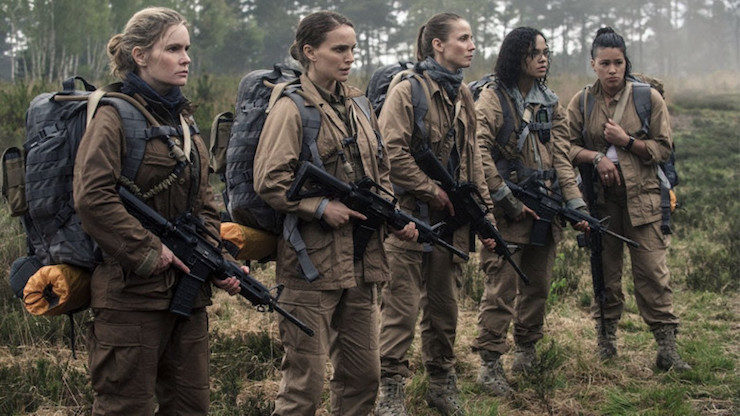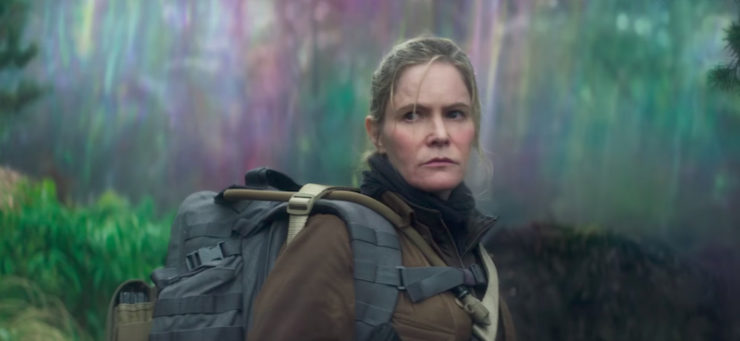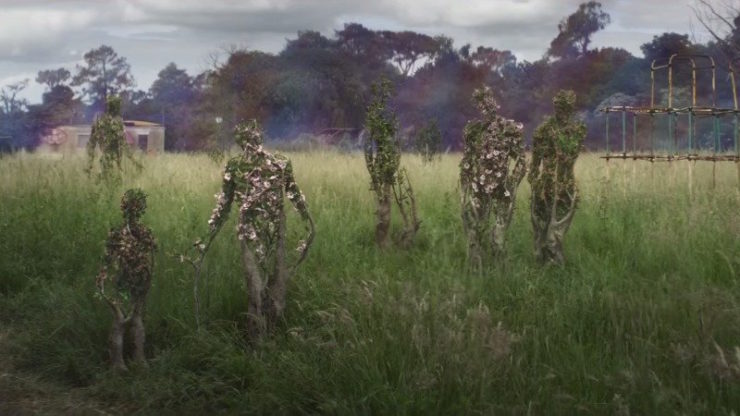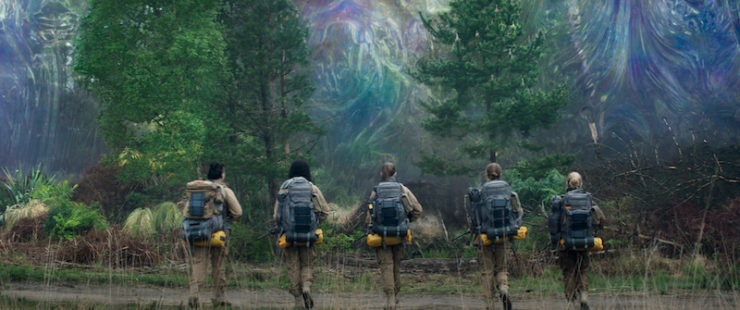I’m honestly not sure what to say about Annihilation. The best I can come up with is: what if the worst parts of Contact had a child with the best parts of Arrival, which then had a torrid affair with The Fountain? The resulting progeny might look a lot like Annihilation. Which is to say: the parts I loved I really loved, and the parts that didn’t work for me nearly jarred me right out of the film.
An attempt at a non spoiler review lurks below.
Annihilation is Alex Garland’s adaptation of the first novel of Jeff VanderMeer’s Southern Reach Trilogy: Annihilation, Authority, and Acceptance. I have only read the first novel so far, and loved it. It had a beautiful blend of Lovecraftian weirdness, Floridian weirdness, and ecological horror that exactly meshed with my own reading sensibilities. Everyone go read the book!
This adaptation is not even remotely faithful, but it does capture a lot of the tone, and the general feeling of uncanniness, much better than I expected any film to do. The book is very interior; there are lots of long scenes of people sitting still and thinking, freaking out about their situation, remembering past tragedies—it’s not terribly cinematic. But Garland makes the most of the visuals that hover between enchanting and terrifying.

The movie also adheres to the book’s basic plot. A mysterious event has struck an area in Florida that is now called “Area X.” The area—which is more or less St. Marks, in the Florida panhandle—has been enveloped in an entity the movie names “The Shimmer.”
The US government has sent team after team of soldiers in to investigate, and none have returned…until now. A soldier played by Oscar Isaac shows up in his house a year after his mission. He can’t remember where he’s been, or what happened to his unit. His wife, Lena (Natalie Portman), a biologist with a background in the military, decides to join the latest troop in order to understand what happened. The rest of the all-woman unit is made up of Ventress, a psychologist (Jennifer Jason Leigh), Radek, a physicist (Tessa Thompson), Thorensen, an EMT (Gina Rodriguez), and Sheppard (Tuva Novotny), an anthropologist.
Readers of the books will notice a change—there are only four team members in the book, and each of them is only known by their function: they are The Anthropologist, The Surveyor, The Biologist, and The Psychologist. The Biologist is only ever The Biologist, and while we learn about her past and her tangled emotions, we still experience her, and the rest of the team, as their functions before anything else. This had a flattening effect in the book that added to the feeling of being unstuck in reality, and heightened the tension between the team fighting to maintain their old reality, and wanting to lose themselves in the mysteries of Area X. I doubt this would have translated well to film, so I’m pleased with the filmmakers’ decision to give the characters slightly more characterization.

Another change that book-lovers might appreciate knowing about is the absence of the tunnel/tower. While that sentence is probably meaningless to a lot of you, the tunnel/tower is a huge part of the book, and vitally important to its themes, and I think it’ll be helpful to those of you who have read the book if you know not to expect it. I know that my colleague Molly and I spent a lot of the screentime waiting for it to turn up. I’m not exactly disappointed by its absence, but I also think I would have settled in and focused on the film more if I hadn’t had that nagging question of when, or if, it would appear. This also necessarily changes the scientists’ relationship to Area X, because it becomes a bit less about communication, which is funny to me since the film reminded me more of Arrival than anything else. I turned it over in my mind a few times, and I think the connection to that film is in the way Annihilation deals with grief and guilt.
Where the book focuses on grief, and fuels much of its horror with that sense of melancholy, I would argue that the film focuses too much on guilt. This is one of the rare points where Annihilation falters when it comes to gender, because I felt that by focusing on Lena’s guilt as a motivator, the film undercuts her role as a scientist. Rather than plunging into the unknown to learn and make discoveries, she feels that she owes something to a person she loves—which is a completely different catalyst. It just strikes me as a little too easy to say, “Lena feels guilty, so she went to Area X.” The film gives each of the team a motivating impulse where the book leaves more to the reader’s imagination. (One woman is sick, one woman lost a daughter—as is apparently now required in all genre films—and one woman is an addict.)

In some ways the movie represents a huge leap forward. It gives us an all-female ensemble, an openly queer character, casual diversity, and, best of all, scientists who actually act like scientists. These aren’t the bumblers of Prometheus, trying to hug every horrifying monster they see—Lena observes nature, takes samples where she thinks they’ll be useful. Radek panics when she realizes her tech won’t help her in The Shimmer, but then recovers and uses old-fashioned powers of observation, and the willingness to suspend disbelief in the face of the fantastic, that make for an excellent physicist. Ventress both analyses the others and keeps a tight, tight lid on her own emotional tells, just like every psychologist I’ve ever known.
But even having said that, I’d say this film is more “feels-provoking” than “thought-provoking.” Many of the visuals, and particularly the more horrific elements, elicit a gut response, and even hours later I found myself in a fog of emotion, still not ready to move into the intellectual debate mode…as might be clear from this review. The ensemble is so fantastic, they make these roles work even when the script gets a little thin. Natalie Portman covers a huge range of emotion in this role, from flashbacks to happy beeps with Oscar Isaac to the grey, unmoored blankness of grief. Tessa Thompson is lovely in a role that is the polar opposite of the hard-drinking, hard-fighting, friend-of-Hulk Valkyrie, and Jennifer Jason Leigh is steely and brittle and weird, and absolutely perfect.

One thing the film gets perfectly right, surprisingly, is Florida. Florida’s hard to get right – after spending most of my life there, I still don’t feel like I always capture it. But this movie does, despite being shot largely in the UK. It’s based in a particular area of the state, St. Marks (just a short drive from Wakulla Springs), where swampland edges into coastline. The vegetation is cypress, pine, live oak, palmetto—beautiful plants that hide spiders and cockroaches. The wildlife are alligators, boars, bears, and deer. The lush beauty, the heat, the rot, the bone-deep knowledge that literally every animal, insect, and plant is trying to murder you, is infused into every moment of this film. But where it truly gets it right is that it isn’t just that people realize there are monsters in the water, or that the plants might be more than they seem—it’s that just as often the terror gives way to awe at the beauty of nature, and the ways The Shimmer has transformed it.
I must also note that this is a horror film. It’s being marketed as a sci-fi story—a team of scientists go into a strange territory to investigate the unknown. But it’s at least as much a body horror film, and please be aware that there are multiple, long scenes of graphic, drawn-out violence. There are also moments that recall Bryan Fuller’s Hannibal more than anything else. Personally, I was fine with it (sometimes more than fine) but be aware of your own needs. I enjoyed seeing it in the theater, but I noticed that the audience was having some of the most visceral reactions I’ve seen in a film in a long time. People gasped, hid their faces, shrieked, and I’d say about a dozen people fled over the course of the first hour. I found some of the horrific moments to be the most beautiful, and I didn’t ever think the film veered into shock for shock’s sake. I also want to say, without getting into spoilers, that the last half hour of the film…the phrase “batshit” doesn’t encompass just how insane the film gets. (Hence my mention of The Fountain in the opening paragraph.) I can’t imagine that we’ll see a film this year so committed to sheer unmoored beauty. Sometimes it’s indulgent, sometimes it’s ridiculous, but I doubt we’ll get another film quite like it.

Leah Schnelbach did not expect this film to make her homesick. Come tell her whether it’s a floor wax or a dessert topping on Twitter!











I love this relatively non-spoiler review…now I really want to see this movie.
Thanks!!!
And read the books!
The trailer (with its Contact-y and Arrival-y comparisons on its sleeve) didn’t inspire me to go see this, and I still don’t think I’ll go out of my way for it, but that being said, I now know that I will see it, just probably not at the cinema. I’ll more likely wait for it to hit a streaming service, and in the mean time, I will certainly now investigate the books.
When I first saw a newspaper description of the plot, I thought it might be a derivative of the Strugatskys’ “Picnic on the Wayside.” Having seen this review, that seems much less likely, but not impossible. Any idea if there is a connection?
@Egad
I haven’t seen the movie yet but I’ve read both Picnic and Southern Reach (I liked Southern Reach much more tbh) I’d say they come from a similar place plot-wise but stylistically they are very different. I can’t say for sure that Jeff wasn’t inspired by Picnic but I think I’ve read an interview where he said he just wanted to sate his hunger for a weird novel about nature… and Florida
Leah,
“Come tell her whether it’s a floor wax or a dessert topping on Twitter!”
That’s brilliant. I’m just go sit here and bask in it!
Yeah, just went to go see this. It totally reminded me of Arrival. But God, I am so tripped out by the ending. I knew it couldn’t really end on a happy note, but… I did NOT expect that.
Also, I’m leaning more towards dessert topping. Maybe some variation of Jell-O?
The description of the book sounded like a female version of Lem’s “Eden”. I wonderif the author was aware of this other story. It is not only the trick of reducing characters to their job description that is shared in both stories, but it is also the choice to to have a comparable plot, but replacing the all male perspective by an all female cast and exploring on how this affects the storytelling.
@Egad @Ine It also seems to have a lot in common with J.G. Ballard’s Crystal World stories.
Watching this movie, I kept thinking of Shane Carruth’s Upstream Color.
I don’t see the similarity to Arrival at all, other than being a sci-if film with a female protagonist. To me, the film is very similar to Solaris and Stalker. If those films had a baby, it would be Annihilation surely.
I used to live in Tallahassee and was surprised how much this movie made me miss living there. And I never miss living there :-) But, yes, I’m glad you mentioned just how well this movie captures all things “Florida.” Great review.
I speculated on twitter that Annihilation was inspired by Algernon Blackwood’s “The Willows”. Vanderberg said the strongest influence was Michel Bernanos’ “The Other Side of the Mountain” (collected in the Vanderbergs’ The Weird anthology). After reading it, I can see it, especially because of the emphasis on [spoiler omitted].
I’m not sure why the film is marketed as an adaptation of Annihilation, since it really doesn’t seem to me to resemble the source material very closely. As a film, I myownself liked it fine. As an adaptation, it wasn’t.
I had a hard time reading the book. I just couldn’t get into it, but slogged through anyway.
I might watch the movie, it might be more entertaining, but think I will wait for it to come out on Netflix.
I wish I had read this review prior to seeing the film. Well, actually, had I done that, I would not have seen the film. I do not like horror movies at all, and this was presented to me as a Sci-Fi film. I had not read the book–my husband had, and had found it thought-provoking. He enjoyed the movie, even as it diverged from the book, as it held the essence of the book.
Well-written, spoiler-free review!
Vandermeer’s Annihilation is the only book I have ever encountered which made me feel physically ill. It was such a strong reaction that I wanted company around for reassurance while I was reading. Company notwithstanding, I stopped reading and waited three nights to pick up the book again, only to revisit the same sense of creeping horror and profound nausea. At no other time in this period of days did I experience any symptoms of real illness. It was a completely singular experience. I have no wish to repeat it and will probably never read another book by Vandermeer. That said, I’m impressed as hell that a writer was able to craft a work of fiction that provoked palpable discomfort and illness.
Great stuff. Not merely spoiler-free. I’m sure it will enhance my eventual enjoyment of the movie.
By the way, that link at “Florida’s hard to get right” leads a long and extremely enjoyable piece that you owe yourself to read.
Silly me never realized the VanderMeers are in Tallahassee until after I moved to Dallas and read this book. The whole way through I thought…this is set in St. Marks NWR…no, I’m reading that into it. Then I read the endnotes and realized the setting was indeed based largely on St. Marks. (I think that’s less true for the sequels.) If the movie gets North Florida right I have to see it, even though, honestly, I wasn’t thrilled with the books otherwise.
ANNIHILATION comes off as a distinct disappointment. Garland has acknowledged a debt to Russian Director Andrei Tarkovsky’s STALKER (which was re-released last year to major acclaim). It also bears a resemblance to Tarkovsky’s SOLARIS. But, whereas Tarkovsky took an exclusively intellectual approach to the material, Garland attempts to synthesize that method with a more visceral one (and there are a couple of very graphic examples).
Some of the science is fascinating. Unfortunately, the characterizations of the women are dreary and uninteresting. Whenever a new turn in the mystery is encountered, it is almost invariably met with dull interactions among the women, not to mention their often foolish behavior. More than once, they encounter evidence of previous expeditions, only to turn away before exploring all of it – so much for all that scientific and military training!
As noted, Garland’s adaptation not only owes a debt to Tarkovsky, but, sci-fi fans will also see parallels to the Alien series, THE THING, 2001, PHASE IV, ARRIVAL and others. But, here, the mix between the purely intellectual aspects and the more physical ones never mesh. It’s also curiously over-written in a manner that most experienced screenwriters don’t fall into. The result is that ANNIHILATION ends up being a compromise on both ends. No wonder test audiences and the movie’s Producers themselves wanted changes (the studio was so hesitant to give it a major theatrical release that it was sold to Netflix overseas, and barely escaped that fate stateside).
ANNIHILATION is well-produced and solidly acted. The SFX are rendered well. The musical score (Geoff Barrow, Ben Salisbury) is a curious, but largely effect contrast between traditional orchestral and acoustic instrumentation. As opposed to most sci-fi movies today, it is a movie about ideas – and, it has some good ones. Too bad the execution doesn’t quite match the ambition.
I, too, wish I had known the tunnel/tower wasn’t going to be a part of the movie.
“… little too easy to say, “Lena feels guilty, so she went to Area X.”
The film sould have shown more of the ambiguity of feeling by the Biologist and her tendancy for self destruction. The book is more about her, and us the readers, than about “contact.”
(a little late to the party, but well hey I only just got to see it. Spoilers, if anyone’s ever actually reading this)
I… think I would’ve preferred having seen the movie *first*, before reading the books. I found myself anticipating/expecting/”knowing” everything which got in the way of appreciating the movie. That said, I… did not like how the alien entity was “defeated”, but I suppose they needed to make it a more self-contained movie. I found myself feeling… unimpressed by “giant crocodile” and “mutated bear” as “monsters”.
Re: the books… I really liked the first book. And I enjoyed many of the “surprises” introduced by the later books (that the psychologist was the *director* really surprised me). But the whole “alien doppelgänger” element of the books really got in the way of my appreciating it (and actually lowered my overall estimation of the story) because “it’s been done before”, multiple times: I’m thinking Solaris, which got its own remake with George Clooney in it (which was a movie I liked). So many elements were taken that I’m wondering if Jeff Vandermeer had a friend who was familiar with Solaris and had subconsciously contaminated his thinking/ideas, say. You even have a person fighting his own doppelgänger and then “the wrong one” surviving. (I’m saying “subconscious contamination” because if Vandermeer had actually been familiar with Solaris then it seems unconscionable to me, to use those elements again so directly).
Bumping the thread, since I just saw this at last, courtesy of the library. I loved Garland’s Ex Machina, and I liked the idea of an all-female team exploring something complicatedly alien, but this one disappointed and bored me. I saw people talking about how “intellectual” it was, but I found it rather shallow — some ideas about biology and the nature of death and change were touched on but not really done much with. And even though they sent in several scientists to confront the unknown and alien, all they did when they encountered it was to shoot it or set it on fire — how is that cerebral? There were some really beautiful images toward the climax, but the concepts were too fanciful and too superficially developed, the pace was too slow, and the characters too unsympathetic and underdeveloped.